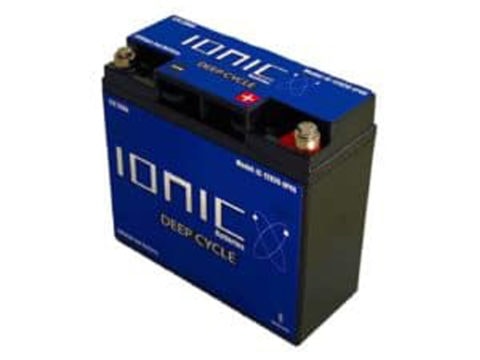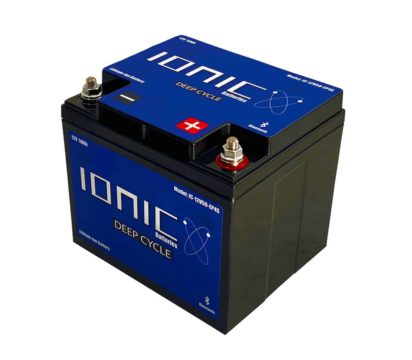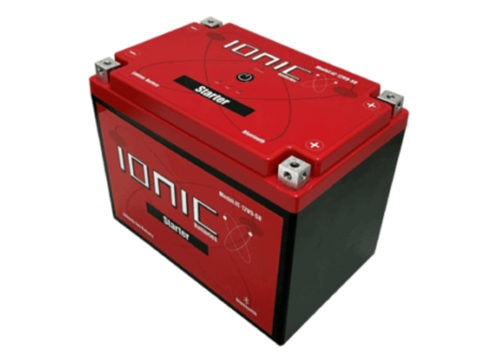When it comes to choosing a battery for your bass boat, RV, golf cart, or even work equipment it’s important to make the best decision. Beyond initial investment, there are a lot of other important factors to consider. How long will your battery last? Will it require maintenance? How long does it take to charge?
The decision you make today can affect your hobby or workflow for years to come. Below we’ll share some of the pros and cons of each battery type. So when it comes down to Lithium Vs. AGM, who will be the winner? We’ll let you decide for yourself.
What Is An AGM Battery?
Lead-acid batteries have been around since 1859. We mention that because AGM batteries are technically lead-acid batteries, but a more advanced version of them. Though typical, flooded lead-acid batteries are still popular and in regular use, AGM batteries are a big improvement.
AGM stands for Absorbent Glass Mat. This version of lead-acid batteries is more user-friendly. They charge faster than their older siblings and there’s little to no off-gassing. Another huge perk is that AGM batteries don’t require the same maintenance as traditional lead-acid batteries. AGM batteries are technically sealed. So you can bypass the annoying “watering” of your batteries. This is a big win but comes at a higher price.
What Is A Lithium Battery?
Lithium batteries have been around for about 25 years. They’re the new kid on the block, so to speak. There are actually two different types of lithium batteries. One uses lithium-ion cells and is found in smaller devices, like laptops and cellphones. But the battery type that’s of interest to us and is the focus of our Lithium vs. AGM showdown is LiFePO4 lithium.
These batteries consist of lithium iron phosphate. They’re capable of holding more energy per unit of weight than other deep cycle battery types (including AGM). Much more and that’s why they’re so lightweight! Lithium batteries are also known for their long life and amazing efficiency. They’re known to be non-toxic, safer, and more advanced than other battery types. But they too come at a higher price.
Ever wonder how long marine batteries should last? Find out here!
Battery Charge & Discharge Rates
When it comes to a last-minute fishing trip or keeping the course’s golf carts charged, your charging speed matters. No one wants to wait, especially guests paying for an expensive round of golf. Lithium batteries are quick. They typically take 1-5 hours to charge vs 5-12 hours with AGM. That’s a significant difference
The discharge rate is another thing to think about. It will affect how often you have to charge your battery, among other things.
New AGM batteries have a discharge rate of 1-3% per month. This is pretty impressive, considering flooded lead-acid batteries are a good bit higher. Some speculate the rate to be around 5-8%. Whereas, others think it’s much higher. A lot will depend on the age of the battery. Either way, AGM batteries are a big improvement. Lithium comes out slightly ahead of AGM batteries, at around 0.5-3%. So, when it comes to Lithium Vs. AGM batteries, they’re pretty neck in neck. Now there is one area where lithium shines. You can deplete a lithium battery 99% and then recharge it. AGM batteries can only be discharged to 80%. This means you won’t have to charge a lithium battery as often. And when you do, it will charge way faster than an AGM battery.
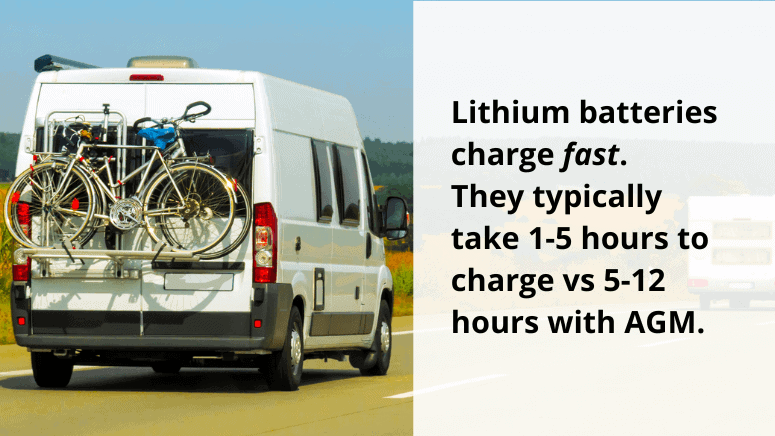
AGM Battery vs Lithium: Performance
What’s the use of buying a new battery if it’s not going to perform well? Thankfully both AGM and lithium batteries are superior to flooded lead-acid. But who’s the winner in the battle of the batteries? When it comes to performance, here’s a quick run-down in varying temperatures..
Batteries aren’t meant to charge in freezing temperatures. Lithium batteries are equipped with a battery management system (also known as “BMS”). What does this mean? Lithium batteries have protection from over or under protection, as well as safety from dangerous temperatures. If temps are too high or low your BMS will safeguard your batteries. For that reason, lithium batteries won’t accept a charge when the temperature is below freezing. AGM batteries don’t come equipped with a battery management system, therefore they may accept a charge. It’s also possible that this may damage the battery.
Now as far as operating in high and low temperatures, both battery types come out around the same. You’ll want to look at the specific temperature range for the battery you’re interested in, but lithium and AGM come out around the same. Ionic lithium can operate from as low as -4℉ to 140℉. Many AGM batteries claim the same specs.
Now if you want to charge a battery in frigid conditions a lithium heated battery may be your answer. This option is ideal for those who RV in harsh environments.
Safety & Environmental Impact
Lithium batteries are generally considered to be safer than AGM batteries. But again, AGM batteries are a big improvement over flooded lead-acid. That’s because AGM batteries are sealed, so little to no off-gassing occurs. But if you’re looking for an even more environmentally friendly and safe option lithium has the edge. Lithium batteries are non-toxic and leak-free. Both battery types can be recycled.
Tipping The Scale In The Right Direction
Ok, we admit it. We’re not seeing many benefits to going with AGM over lithium (with one exception that we’ll discuss below). And weight is another factor where lithium strikes again. Lithium batteries weigh 50% less than AGM. Now depending on what you’re powering, saving weight here and there might not matter. But if you have multiple batteries in an RV, that weight is going to add up and increase fuel costs. Or if you have a golf cart, you may experience some serious lag if you have a hefty battery on board. Decreasing weight is a major benefit for some. Lugging around lighter batteries is better on your back too.
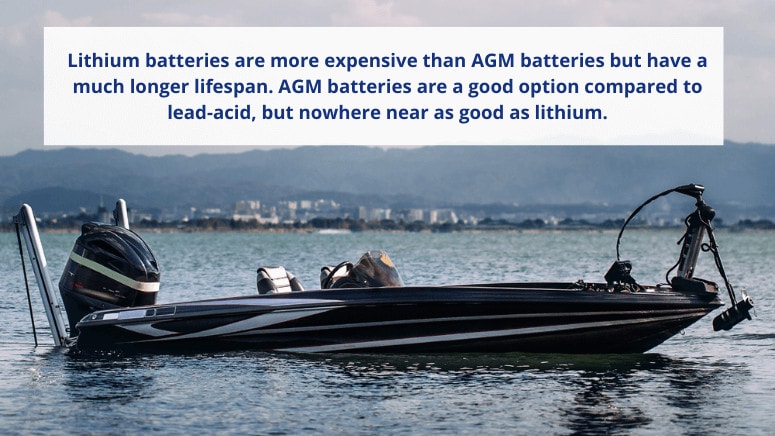
Lithium Vs. AGM: Bluetooth Technology
One of the other major advantages of lithium batteries is the technology behind them. Unlike AGM batteries, lithium batteries feature Bluetooth technology. This allows you to check the status of your battery at any time. This means you can make sure everything’s running smoothly before you set out in your boat, head out in the RV, or take the UTV out for a ride.
You can check your remaining charge, voltage levels, temperature, and more. Bluetooth connectivity puts the power of knowledge directly into your hands. Say goodbye to guesswork and uncertainty, and hello to peace of mind – with lithium batteries and Bluetooth technology, you’re always in control of your power needs. Bluetooth works by accessing our Ionic App with your smartphone – all of your battery’s info, just a couple taps away.
Which Deep Cycle Battery Price Is Right
Lithium deep cycle batteries are more expensive than AGM deep cycle batteries. This is one downside you can’t get around. If you can’t afford the higher initial cost of lithium, AGM batteries are probably a good option, especially when comparing them to flooded lead-acid. However, if you can make the initial investment it’ll pay off.
The longevity of a lithium battery is far superior to AGM. With lithium batteries, you’ll get approximately 3,000 – 5,000 partial cycles. With AGM batteries, you’ll get about 500 cycles. Some batteries boast 600. But even still, there’s no comparison. A lithium battery can easily last 10+ years. Can the same be said with AGM? It all depends on how often you’re going to use your battery and whether or not you can make that initial investment.
The Final Verdict
Lithium and AGM batteries both offer advantages and disadvantages but at the end of the day, if you’re looking for a reliable, efficient, and lightweight solution that is maintenance-free, the choice is clear. Lithium batteries are the best choice for your application. Their increased performance, longer lifespan, and integrated Bluetooth technology can make life much easier. They can also save you time and money in the long run.
Discover more about lithium vs lead acid here!



